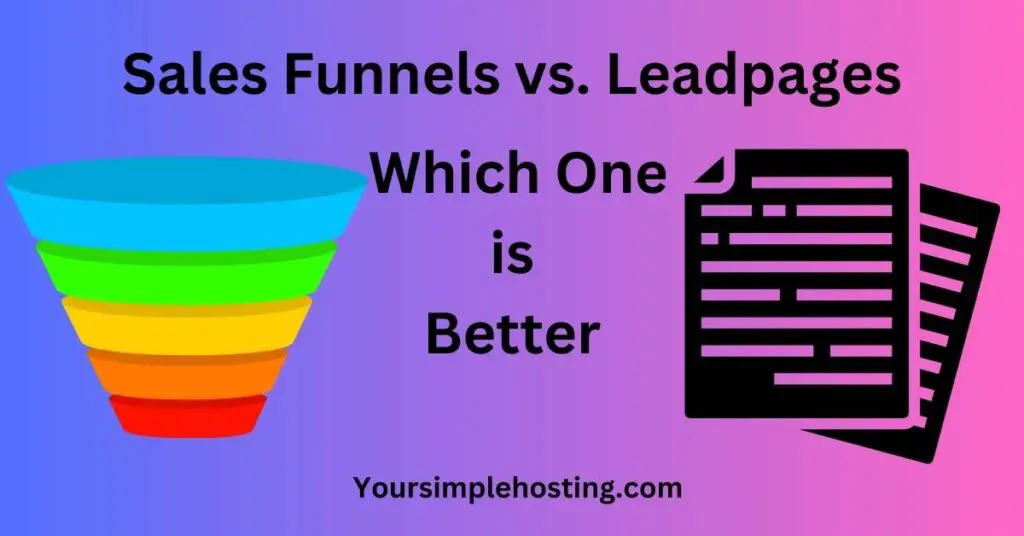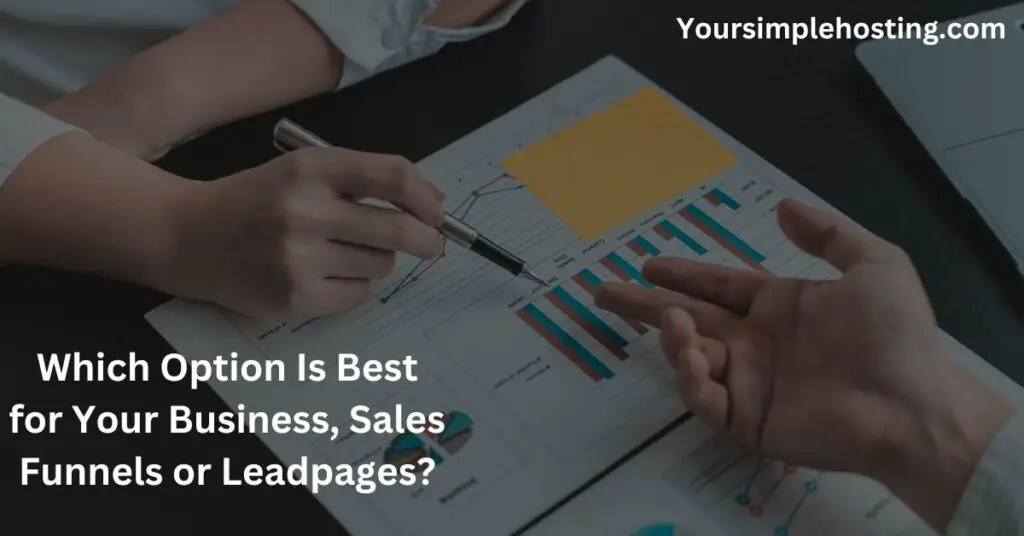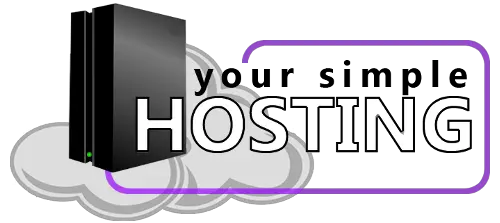Many tools are available to help you create an effective sales funnel when launching a successful online business. Two of the most popular tools are Leadpages and Sales Funnels. Both tools are great for creating a sales funnel, but which is better?
Leadpages is an all-in-one online platform that simplifies website development, content optimization, and marketing campaigns. It helps businesses create landing pages, regardless of design or coding skills.
A sales funnel is the path potential customers follow from prospecting to purchasing. It is designed to maximize conversions and help businesses effectively engage with their target audience.
This article will compare and contrast the two, exploring the advantages and disadvantages of each so that you can make an informed decision about which is the better option for your business.

Table of Contents
Leadpages
Leadpages is a comprehensive online platform designed to facilitate website development, optimize content, and streamline marketing campaigns. It is a powerful tool that enables businesses to easily create landing pages, regardless of their level of expertise in design or coding.
One of the most significant advantages of Leadpages is its user-friendly interface, which comes equipped with website-building tools and templates, making it easy for businesses to get started. In addition, the platform offers a range of customizable templates that allow users to quickly create landing pages, sales funnels, and other marketing campaigns.
Moreover, its drag-and-drop interface allows users to create stunning websites without any coding experience. In addition, the platform offers a wide range of customization options, including personalized branding, image, and video integrations, that enable businesses to create a unique online presence that aligns with their brand identity.
In addition to website development, it offers a suite of features designed to facilitate lead generation and automate marketing campaigns.
For instance, users can create specialized sales funnels with direct links to their email service, making tracking customer engagement and nurturing leads easy.
Leadpages also offers lead digits and links, enabling businesses to run webinars, attract customers through emails, and set up website pop-ups. This feature is handy for companies looking to engage customers and build lasting relationships with their target audience.
Another significant advantage is its ability to optimize content and deliver files instantly, making it easy for businesses to provide high-quality content to their customers.
Leadpages also offers a wealth of marketing resources, tutorials, and courses designed to help businesses enhance their marketing skills and optimize their marketing campaigns.
The platform also provides a supportive community of like-minded marketers, making it easy for businesses to connect with other professionals and learn from their experiences.
Sales Funnel
A sales funnel is a web page sequence that guides prospects to purchase a product or service. It is more complex than Leadpages, designed with a single purpose: to turn clicks into customers!
Uses
Prospects may come across your brand in various ways, but utilizing sales funnels can guide them toward purchasing. These funnels typically include a page to capture leads, webinar replays to educate and generate interest, and pages to offer additional products or related services.
Sales funnels can cover different stages of a customer’s journey depending on the type. For instance, a straightforward sales funnel (sales page > order page > thank you page) would be at the end, while one designed to capture leads and make sales (opt-in page > sales page > order page > thank you page) would cover both middle and end stages.
Anatomy
Sales funnels can vary in complexity, but all contain the same essential elements:
- Opt-in page: This is the first page of the funnel and the place where prospects provide their contact information.
- Sales page: This page is where prospects learn more about the product and are encouraged to purchase.
- Order page: Where prospects enter their payment information and make the purchase.
- Thank you page: Where prospects are redirected after making the purchase.
Case Study
An e-commerce store may create a sales funnel that starts with a lead page to capture leads, followed by a webinar to educate prospects on the product and its features, then a sales page to persuade them to make a purchase, followed by an order page and a thank you page.
This sequence of pages provides the potential customer with information and guidance throughout the process and encourages them to convert from a lead to a customer.

Which Option Is Best for Your Business, Sales Funnels or Leadpages?
Leadpages is a versatile tool enabling businesses to create high-quality landing pages quickly. While it can help attract and convert leads, its purpose differs from a sales funnel.
When deciding whether to use Leadpages or a sales funnel, companies must consider their specific goals, product or service offerings, and target audience to determine if it fits their marketing strategy.
A sales funnel can be a more productive choice for businesses with multiple products or services to promote. For instance, a video game company may use a sales funnel to market and sell different IPs, while an animation studio may create different funnels for its various services.
On the other hand, Leadpages is an excellent option for businesses that want to generate leads and facilitate interaction with potential customers. In addition, Leadpages are ideal for companies that offer intangible services or have a single product or service to promote.
It allows businesses to showcase their products or services, educate their customers, and provide valuable content in exchange for their contact information. They can also provide customers with an easy way to interact with businesses by scheduling a call or booking an appointment.
Leadpages enable businesses to establish trust and build relationships with customers, while sales funnels focus on hooking potential customers and guiding them toward a purchase.
Using both tools together can yield optimal results by providing businesses with a comprehensive marketing strategy encompassing lead generation, customer acquisition, and retention.
Conclusion
Ultimately, when deciding between a sales funnel or Leadpages, consider your goals. For example, if your main goal is to acquire leads, Leadpages is the most suitable option.
On the other hand, if you are focused on making sales, upselling, and generating leads, a sales funnel is the better choice. It’s advisable to test both and compare the results to make the most informed decision.

Leave a Reply